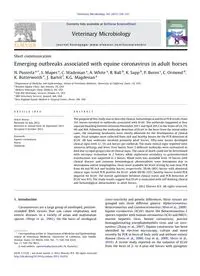
2013 Emerging outbreaks associated with equine coronavirus in adult horses PDF
Preview 2013 Emerging outbreaks associated with equine coronavirus in adult horses
Short communication Emerging outbreaks associated with equine coronavirus in adult horses N. Pusterla a,*, S. Mapes a, C. Wademan a, A. White a, R. Ball b, K. Sapp b, P. Burns c, C. Ormond d, K. Butterworth e, J. Bartol f, K.G. Magdesian a a Department of Medicine and Epidemiology, School of Veterinary Medicine, University of California, Davis, CA, USA b Bracken Equine Clinic, San Antonio, TX, USA c Elkhorn Veterinary Clinic, Elkhorn, WI, USA d Oak Hill Veterinary Services, Orinda, CA, USA e SRH Veterinary Services, Ipswich, MA, USA f New England Equine Medical & Surgical Center, Dover, NH, USA 1. Introduction Coronaviruses are a large group of enveloped, positive- stranded RNA viruses that can cause respiratory and enteric diseases in a variety of avian and mammalian species (Wege et al., 1982). On the basis of serological cross-reactivity and genetic differences, these viruses are grouped into three different genera: Alphacoronavirus, Betacoronavirus and Gammacoronavirus (Woo et al., 2009). Equine coronavirus (ECoV) shares the Betacoronavirus-1 species together with human coronavirus OC43 and HKU1, murine hepatitis virus, bovine coronavirus, porcine hemagglutinating encephalomyelitis virus and rat coro- navirus (Zhang et al., 2007). Equine coronavirus has been identified by electron microscopy, culture and more recently by PCR in feces of foals with and without enteric disease (Davis et al., 2000; Guy et al., 2000; Slovis et al., 2010). A recent study reported on the isolation of ECoV from the feces of 2- to 4-year-old horses with pyrogenic Veterinary Microbiology 162 (2013) 228–231 A R T I C L E I N F O Article history: Received 16 July 2012 Received in revised form 26 September 2012 Accepted 5 October 2012 Keywords: Equine coronavirus Horse Outbreak A B S T R A C T The purpose of this study was to describe clinical, hematological and fecal PCR results from 161 horses involved in outbreaks associated with ECoV. The outbreaks happened at four separate boarding facilities between November 2011 and April 2012 in the States of CA, TX, WI and MA. Following the molecular detection of ECoV in the feces from the initial index cases, the remaining herdmates were closely observed for the development of clinical signs. Fecal samples were collected from sick and healthy horses for the PCR detection of ECoV. All four outbreaks involved primarily adult horses. Fifty-nine horses developed clinical signs with 12–16 sick horses per outbreak. The main clinical signs reported were anorexia, lethargy and fever. Four horses from 3 different outbreaks were euthanized or died due to rapid progression of clinical signs. The cause of death could not be determined with necropsy evaluation in 2 horses, while septicemia secondary to gastrointestinal translocation was suspected in 2 horses. Blood work was available from 10 horses with clinical disease and common hematological abnormalities were leucopenia due to neutropenia and/or lymphopenia. Feces were available for ECoV testing by real-time PCR from 44 and 96 sick and healthy horses, respectively. 38/44 (86%) horses with abnormal clinical signs tested PCR positive for ECoV, while 89/96 (93%) healthy horses tested PCR negative for ECoV. The overall agreement between clinical status and PCR detection of ECoV was 91%. The study results suggest that ECoV is associated with self-limiting clinical and hematological abnormalities in adult horses. � 2012 Elsevier B.V. All rights reserved. * Corresponding author at: Department of Medicine and Epidemiology, School of Veterinary Medicine, University of California, One Shields Avenue, Davis, CA 95616, USA. Tel.: +1 530 754 5523; fax: +1 530 752 9815. E-mail address:
